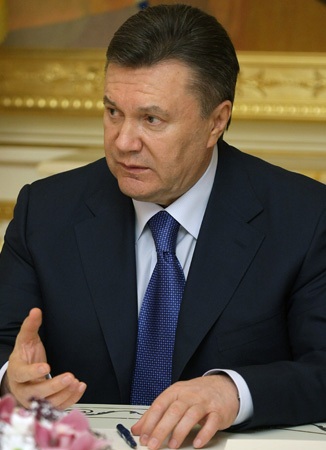Two hundred and twenty-six votes were needed to include the bill on the agenda. The legislation would have “seized property acquired by criminal means.” The final tally, however, was 169 against; 8 abstentions; and 99 not voting.
The bill was drafted to establish a system where the state could identify assets acquired by “criminal or other illegal means,” and seize them. But while public sentiment strongly supports the reclamation of stolen assets, the bill drew criticism on several fronts.
It would have allowed the state to confiscate assets allegedly stolen by Yanukovych and other members of the political elite. Critics, however, said it would also “fail to provide sufficient guarantees of a fair and public trial,” for defendants in future trials.
The legislation would also have allowed a portion of the recovered assets to finance the defense budget.
A similar bill was rejected in April.
One of those voting against was Nadezhda Savchenko, the Ukrainian pilot elected to Parliament in 2014 while she was a prisoner of war in a Russian prison, who said that as drafted, the bill would only benefit corrupt military officials.
She said she tried to explain to her fellow lawmakers how the system works. “I explained to them [representatives of the General Staff] that the money they have, they have stolen,” she said, and she fears that as written, the bill does not contain sufficient safeguards.
Savchenko insisted that she is ready to pass an asset recovery bill once she is sure the assets seized will be protected.
“I am for [taking the] Yanukovych money” back, she said, “but I am afraid that they have already stolen it.”
Parliamentarian and civic activist Tetiana Chornovol took the microphone after the bill was rejected to voice her displeasure. She said any money recovered would be used to fight the “Russian aggressor,” and spoke about a Ukrainian soldier who was killed because his equipment was not up to date.
People’s Front party leader Maxim Bourbaki said the money should be confiscated quickly or else it might go back to the original offshore accounts of Yanukovych.
Parliamentarian Dmytro Tymchuk of the same party had supported the bill as well the funds it would provide the military. He said only a portion of it would go to the military and the rest would be spent on social programs.
After the bill was rejected, Tymchuk responded in a lengthy Facebook post, calling critics of the bill “Defenders of Yanukovych’s assets.” He said that he did not understand what the big problem was and that they should not wait to retrieve the assets.
“The money can still be withdrawn today, but tomorrow, that is the big question,” he said.
The European Union (EU) responded to the bill’s defeat by saying it had been a step in the right direction, but that overall it did not appear adequate. Officials offered their support to help draft better legislation in the future.
This is the second time a bill has been introduced to allow the government to seize Yanukovych assets. The last time was in March, when the bill was also criticized by the EU as a “rather hasty step” that did not adequately protect due process.
The bill comes at a tense time as the country struggles to fight corruption.
Jose Ugaz, global chairman of the non-governmental watchdog organization Transparency International (TI), visited Ukraine last week to discuss what must be done to bring down Ukraine’s most corrupt politicians and claw back the billions they stole.
Corruption reform has been on the forefront of politicians' agendas, due to ongoing court cases with the Russian Federation and Panama Papers leaks involving President Petro Poroshenko.
Ugaz met with Poroshenko to discuss what judicial reforms are needed to bring a final resolution to corruption cases stemming from the disgraced Yanukovych administration.  Viktor Yanukovych -Premier.gov.ru
Viktor Yanukovych -Premier.gov.ru
Ugaz also suggested Ukraine prioritize bringing “big fish” to justice, saying that vigorous prosecution of high officials would send the message to citizens that the government is serious about ending corruption.
“Capturing elite corrupt officials and other big fish will help increase the level of confidence in the authorities, which now leaves a lot to be desired,” Ugaz said.
Ugaz also reminded Poroshenko that heads of state could face prison sentences, citing former Peruvian President Alberto Fujimori, who appointed Ugaz and is now serving 25 years behind bars.
Poroshenko was recently revealed in the Panama Papers leak to have set up an offshore company in connection with his candy company, Roshen.
Ugaz stressed that for corruption to end in Ukraine, there must be political will.
“Not much has changed for two years in the investigation of Viktor Yanukovych’s case. The money stolen has not been [recovered], and he fled to Russia,” said Ugaz.
On Wednesday, anti-corruption activist and former US attorney Marta Borshch will be visiting Ukraine to give a talk on "How to imprison a corrupt politician: Lazarenko’s case."
Former Ukrainian Prime Minister Pavlo Lazarenko, who served in 1996-1997, was convicted of corruption by Borshch. Her talk on the need for swift reform will be open to the public.






